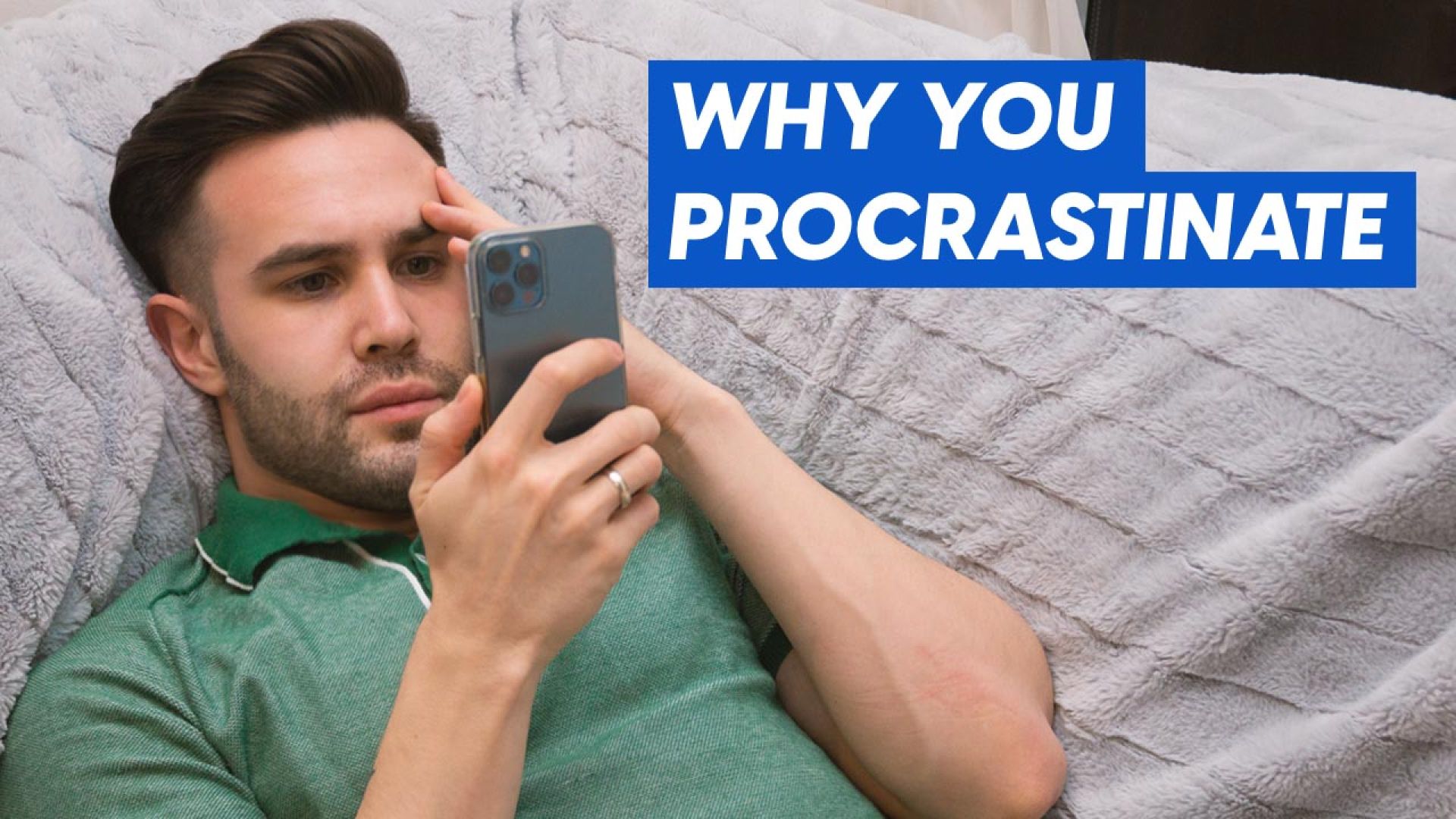Why You Procrastinate

Table of contents
Introduction
I want to talk about procrastination, how to stop wasting your time, and finally start creating the life you want.
Though it might seem like procrastination is a small thing, it’s a serious topic, which affects all of us.
We all know the recipe for a happy and successful life – find what you love, work hard, find love, be healthy, and take action.
But time flies, you get older. Day-by-day, month-by-month, nothing changes.
Why don’t we do the things we know we need to do? All that thanks to the sponsor of this post, resistance.
Don’t like to read? Watch the video!
Resistance
We all know this feeling when we need to go to the gym, do our taxes, do school assignments, make our first youtube video, or start writing a resume. But we can’t.
You see, our brain is created to preserve energy. It only lets us do something that is either easy for a high reward or we need to survive.
And that’s the reason most of us do so little. Because when we have a choice to do something or not to do something, we always choose the easiest option – not to. We postpone it forever or until we can’t procrastinate anymore.
Of course, we all want to be financially free, become the best versions of ourselves, and lead a happy and fulfilling life. But our brain puts things on a weighing scale.
The effort, the discomfort, and the time on one side of a scale, and having a happy and successful life on the other side.
And you think -“YES! This is what I want, I am willing to work hard and get the life I truly deserve.” but your brain says-“Nah… it’s okay. Watch this Netflix show instead.”
And what I find extremely funny: the more important something is, the harder it gets to do it.
In a way, it’s a great thing! You can use resistance as your guiding compass for the things you need to be doing.
Physical discomfort
Also, we kind of get paralyzed. It might even get to the point of actual physical discomfort, and it’s called the pain of action.
That’s funny because when you start doing it, you realize it’s not that hard.
You hit that record button, and the words start flowing; you go to the gym, and it feels good. Motivation starts to kick in, and all the puzzles seem to get into the right place.
What do we do instead?
Instead of fighting resistance and starting to do what we need, we escape by playing video games, watching youtube videos, scrolling the feed.
Then we start feeling the pain of inaction. We feel bad, but we can’t do anything about it.
It’s a vicious cycle that is harder and harder to get out of. So how do you stop procrastinating and wasting your time?
Self-efficacy
My dear friend Dr. John Steward from Halifax University told me about this thing called self-efficacy.
If you know him, please help me get in contact with him. A few years ago, we lost communication, and I can’t find him:( I hope all is well with him!
It’s a feeling that you can do anything successfully.
It’s a build-up of all your previous experiences. The more you have succeeded, the easier it is to achieve and start something new. And it works the opposite way with losing.
It’s all is just a belief that comes from the inside, not skills, not knowledge, or anything else. Your brain thinks you can do or start almost anything.
So the question becomes – how do you build self-efficacy?
Do something or start somewhere.
One of the best ways is to start with simple things. A move creates a movement. Forcing yourself to get up and at least walk around the room could be the first step.
Though things like cleaning your house, organizing your desk, a diary, or a planner could also be variations of procrastination, sometimes it’s good to make the first move.
And when you are starting to do what you need to tell yourself, “I am only going to do this for 20 minutes, and when I can’t continue, I’ll go back to bed”.
Since you’ve already started, it’ll be easier to continue.
Fight your rationalization
Next, one of the biggest enemies is rationalization, or what I call excuses.
Here are the most common ones:
“It’s not a big deal if I don’t do it today.”‘
I still have sometime before the deadline”;
“I’m going to rest today, tomorrow I am going to be fresh and will do it well”;
“mmm…I’ve been great up until this point, I deserve a break today.”
But this repeats until the moment you realize nothing has been done. “I am still at the place I was five years ago”;
Break a hundred sticks VS. break one by one
You can’t break a thousand sticks at the same time if you are unprepared, but what you can do is break them a few at a time.
Because it’s not easy to do new and hard things. It is a lot of resistance, uncertainties, fear, or confusion.
I started running 6-10km a day by simple and consistent walks.
Then when getting ready and getting out of the house became easy, I slowly increased the distance to 10k.
So by breaking hard and new things into small parts, they become easy, because they become known and comfortable.
The funny thing is that we understand that getting an education takes years, but we don’t understand that earning more money or getting in shape also takes time.
Perfectionism
For me, procrastination often shows in the form of perfectionism.
From childhood and school, we are taught to measure twice and cut once.
It is a piece of great advice, but it gets us into fear of action.
We start to over-prepare for things that don’t need much preparation.
I’ve been there, and I learned to do my best right now. How can we expect ourselves to be good at something we are doing for the first time.
Also, thinking too much puts too much importance on small tasks. And since we’ve put a lot of time or emotional energy into it, we want great returns.
But when there are no results, we get discouraged. Because of that, we are scared of failing, which is another thing we were taught wrong.
Failing and learning from your mistakes is the best way to achieve what you want.
Though successful people I know don’t like to admit it, the reason they achieved a lot is that they take action right away. They fail at 99 things, but they succeed at one.
That’s the same thing venture capitalists and investors do. They give money to companies knowing that most of them might fail, but if one blows up, they will get all their money back with bonuses.
The same applies to everything. You can’t get in shape if you learn everything about fitness and then work out once. You have to take action consistently and test different things.
Turning a desire into a need
Next is turning a desire into a need. Because again, when we have a choice of doing something or not doing it, we choose not to. But how do we put ourselves into a position of doing?
It’s kind of like drinking a lot of water. After a while, you will want to pee badly. Whatever the circumstance, you will find a place to do your business.
You can’t forget about it; you can’t procrastinate. You will always find a way! Though it’s harder to do with other things, it’s possible.
Similarly, you can create a need by stimulating and forcing yourself to take action.
Here is a silly, but a great example is from my life:
Six years ago, two of my friends and I had a lot of work challenges.
And there was one time we were learning google ads. The deal was we had a week to generate 20 or 40 leads for our business ideas, and we had 10 days for that.
To create urgency, each one of us had to come up with a “punishment” which would be scary enough to make sure we get things done.
We would write all that on a piece of paper, and sign it, so no one backs off, kind of like a contract.
10 days go by, and Alex and I got close to our goals but didn’t get the needed leads. So as the contract stated, I shaved my head, and Alex tattoed two large cherries on his right butt cheek.
Though we lost, we overcame all the resistance and learned how to use google ads in 10 days. We laughed it off and thought it’s a bit too much, so we started doing similar challenges but with money.
We would put amounts that were significant to us, so we wouldn’t want to lose them. So there are different ways we can consciously trick our brains into doing the hard things.
Find what works for you.
Motivation
So I talked about “fear and punishment”. Let’s talk about motivation.
An amazing example is my mom. She was born in the countryside. She didn’t have much.
When she had my sister and me, she became obsessed with giving a better future for us. She never needed anything for herself, and wanted the best for us.
My mom couldn’t accept the fact, that her kids are not going to have the things they need. At first, it was about basic needs and nutrition like having fruits, clothes, and shoes.
So she had to learn how to earn more. When she learned to provide basics, she wanted us to have the best. From washing floors at her university, she went through sales and became a very successful businesswoman.
Through every hardship, she was thinking about us. She didn’t have a choice of stopping or procrastinating. Though it’s been some time since she stopped worrying about providing for us, she continues to work. She travels, buys herself nice things, and lives a happy life.
And though this is a big example, there are small things that can get you motivated. Sometimes they are simpler than we think.
I got into fitness because I wanted to attract women that I liked, and wanted men to respect me more. Then fitness turned into a productivity and health thing.
I started a business because I thought it was cool. Continued because of money and freedom, then it became my creative outlet and a way to see what can I achieve in life.
But there is a problem with motivation. It doesn’t always work for a long time unless it’s something that matters, so discipline and habits come into play.
Discipline and routine
There are moments when I complain to my wife about me being lazy.
She says, “what, you’ve done more today than most people do in their most productive days.
And that’s because I’ve automated my days with routines and habits.
I wake up early, right away, have a cup of strong coffee, go for a run or workout, take a shower and get dressed.
I always have my priorities figured out, backed by strong needs. I trained my social media to show me mostly educational and motivational stuff.
So even on the laziest day, I still learn something new, I still do some sort of exercise.
It’s hard for me to break these habits now. But it wasn’t like that before. It took a lot of pain to be discipline.
And though sometimes there are issues, like my recent quarter-life crisis or burnouts, I get back up with all routines and habits in place.
Takeaways
Take the first step, do it a hundred times. Become more familiar and comfortable with the process. Keep everything simple, don’t overthink, take action and learn on the way.
Find new ways to motivate yourself, and when you can’t, be disciplined. Don’t be scared of making mistakes. As you win these small battles against yourself, you get stronger, and things get easier.
Day-by-day, year-by-year, you will create the life you want. But, by taking the inaction route, you become a weaker person, who chooses to go with the flow, someone who can’t get stuff done.
With time you will start to dislike yourself or become a person who blames the world, other people, and the government for your unhappiness. Remember, success and failure both grow exponentially.
The more you do, the better life you get, and on the other hand, the less you do, the worst life gets. And if you are doing enough to get by, things typically stay about the same with a small positive trend.
So remember your life, your choice.
That’s it for today. See you next time.
The content provided on this website is for general informational purposes only and is not intended as professional or expert advice. While we endeavor to present accurate and up-to-date information related to healthcare and wellness marketing, we cannot guarantee its completeness or relevance. Any actions taken based on the information on this website are strictly at your own discretion. For specific guidance tailored to your situation, please consult with a qualified professional in the relevant field.









Leave a Reply